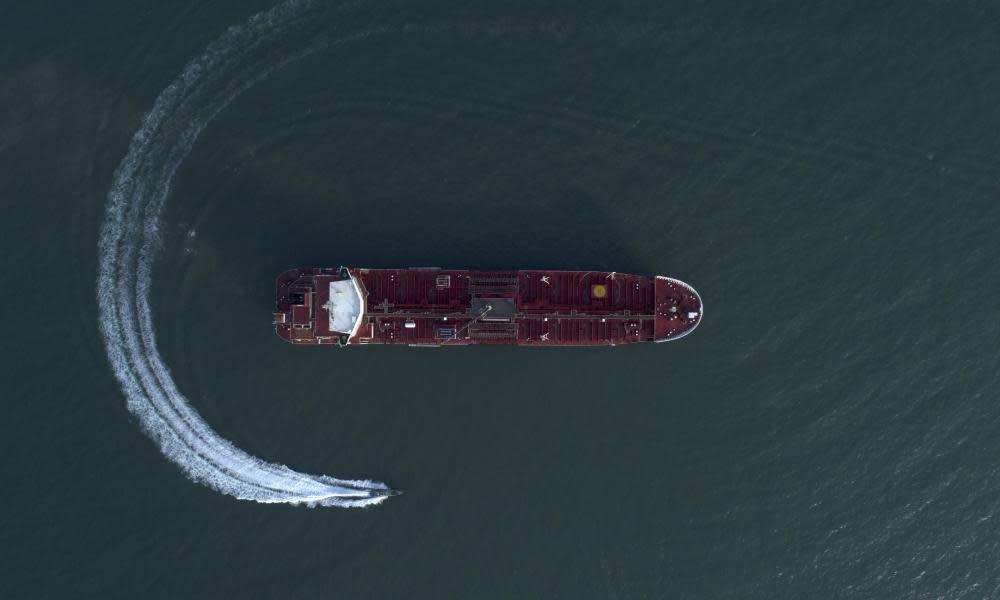Hunt siding with Europe over the US in the Gulf makes practical sense

In possibly his last act as foreign secretary, Jeremy Hunt signalled Britain’s determination to continue to cooperate with Europe on defence and to side with its nearest neighbours, and not Washington, on how to curb Iranian nuclear ambitions.
He told MPs on Monday he wanted to form a European maritime security force to defend shipping in the Gulf rather than join a US-led force. The two might work in cooperation, but they were to be distinct.
With Boris Johnson’s pledge of a “do or die” Brexit so close, Hunt’s decision may seem puzzling to the point of paradoxical.
It is a very practical set of judgements. Washington’s proposed Gulf maritime force – dubbed Operation Sentinel – is struggling to leave the harbour. Many Europeans, defenders of the Iran nuclear deal, will have nothing to do with a US force.
Assembling an American flotilla of the willing is elsewhere proving difficult. John Bolton, the US National Security Adviser, was in Japan on Monday and reportedly failed to persuade Tokyo to join Operation Sentinel.
Japan is one of the countries that richly benefit from the freedom of navigation around the Gulf since it imports so much oil from the region. Trump, keen to persuade more Asian countries to contribute at least financially to Sentinel, very much had Japan in mind.
But Japan wishes to preserve its role as a mediator between the US and Tehran – the Japanese prime minister, Shinzo Abe, visited Tehran just last month – and it can hardly afford to be sailing under the command of one the forces with which it is trying to mediate.
The UK Foreign Office reasons the way to maximise participation in the maritime protection force is not to have the US in command, but instead forces that support the nuclear deal. However much US military regional command, Centcom, reassures European diplomats that enterprise will be largely defensive in posture, it will not be perceived as such by Tehran.
There may also be an element of the British trying to recover its position with Tehran after it decided in cooperate with the US to seize an Iranian tanker allegedly travelling to Syria off Gibraltar.
The strait of Hormuz, which provides passage from the Gulf of Oman to the open sea, is the most important gateway for oil exports in the world. With Iran on its northern shore, and the UAE and Oman on its southern shore, the US Energy Information Administration (EIA) calls it the world’s worst 'chokepoint'
In 2016, 18.5m barrels of crude oil were transported each day through the strait of Hormuz, compared with 16m through the strait of Malacca, which runs between the Indonesian island of Sumatra, Malaysia and Thailand, connecting the Indian Ocean with the South China Sea. 5m barrels of crude oil are transported annually through the next largest chokepoint, the Suez canal.
Valid legal justifications exist for the US-UK action, such as the enforcement of an EU embargo on Syrian entities, but to Iranian eyes, it looked as if the UK was helping enforce a US policy to prevent all Iranian oil exports.
By distancing itself from the US on the issue of a naval protection force, the UK does something to emphasise its independence to Iran.
Nor is such an operation beyond the means of European navies. For the past 11 years the EU Navfor Atalanta has overseen an anti-piracy operation off the coast of Somalia. It is currently led by an Italian rear admiral, and is generally seen as a success. At the height of the piracy crisis in January 2011, Somali pirates held 736 hostages and 32 ships. Many of the UK government instructions sent out to British shipping operating in the Gulf, including on seeking advice from naval patrol boats in advance are borrowed from the advice deployed in Somalia.
Related: UK must look after its own ships in the Gulf, says Pompeo
In the Gulf, a multinational operation, Combined Taskforce 150, also exists focused on combating terrorism and illegal drugs trade, though both it and Atalanta are directed against non-state actors.
There is also a commercial imperative. Iran has threatened to select the US and the UK as targets in the Gulf. Shipping is one of the world’s most globalised industries, and many ships will be tempted to reflag simply to avoid being targets. Flag switching will further imperil the UK ship registry, which has already lost 30% of its tonnage so far in 2019 because of uncertainty over Brexit.
Finally there is a deeper political purpose. Both Europe and the UK have vowed to continue forms of defence cooperation after Brexit. Both see the benefits. France, in particular, cannot afford to lose its key defence partner. A European maritime operation, especially one proposed by the UK, in or out of the EU, would be a practical sign that future defence cooperation will endure.

 Yahoo News
Yahoo News 
